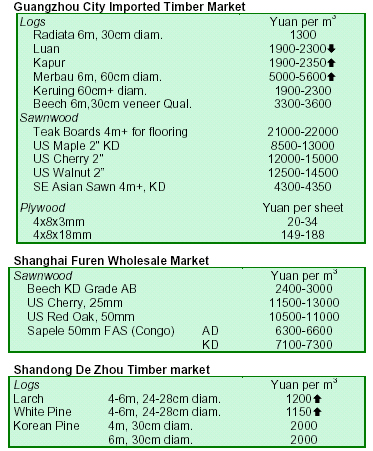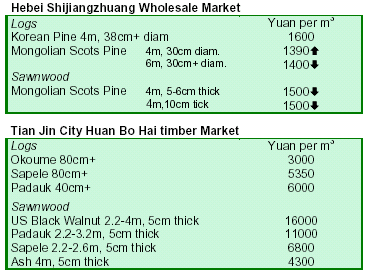US
Dollar Exchange Rates of 13th April
2007
China Yuan
7.722
Report from China
China ends export credit subsidy
China has recently terminated its Central Bank program that allowed certain large exporters to take advantage of
discounted loans. The USA and several other countries had challenged the program at the WTO. The loan
program was among nine Chinese activities the USA had identified as possible violations of WTO rules.
The US Trade Representative, Susan C. Schwab, welcomed the move and hoped China withdrew other
subsidy programs. According to the USA, some of the supports appear to offer benefits to foreign investors and
their Chinese partners to export to the USA and other markets. Others encourage import substitution by
providing incentives for companies in China to purchase
domestically produced goods.
Timber shortages restrain expansion of panel industry
China¡¯s wood-based panel industry has been growing at a double digit rates in recent years in tandem with its
economy. The country¡¯s total output of wood-based panels reached 63.94 million m3 in 2005 and is predicted to be
around 80 million m3 by the end of the Eleventh Five-year Plan in 2010. However, the industry¡¯s expansion is being
constrained by raw material shortages. China¡¯s timber production from state-owned forests has fallen to about 55
million m3 since the implementation of Natural Forest Protection Programme (NFPP). Most domestic timber is of
small diameter and not suitable for plywood face and back. It is not used for fiberboard and particle board due to
its higher prices. Branches and processing residues are not
widely used by wood-based panel enterprises due to higher transportation costs.
Imported timber with larger diameter and good quality is suitable for plywood face and back. However, import
prices have been increasing due to log export restrictions in producer countries. Local experts have recommended
wood-based panel companies to establish raw materials
forest bases, use substitution products (such as shrubs, bamboo and crop stalks) and recycle waste wood.
China¡¯s guidelines for overseas forest plantations
The State Forestry Administration (SFA) has formulated guidelines for the establishment of sustainable forest
plantations abroad by Chinese enterprises. Once approved by experts, the guidelines will be issued jointly by the
Ministry of Commerce and SFA, who will select some companies to implement the guidelines overseas on a trial
basis. The companies should abide by all kinds of binding international conventions and agreements signed by China
or host countries. Illegal conversion uses of forest lands and illegal logging are strictly forbidden.
US manufacturers dominate Chinese furniture exports
Many US furniture manufacturing companies have transferred their production bases to other countries.
According to some statistics, 43.1% of furniture sold in the US market was made abroad in 2006 and 60% of the
furniture exported from China to the USA in 2005 was manufactured by US companies based in China. Most of
the US furniture companies in China are large and have manufacturing bases in Shanghai Municipality, Jiangsu
Province, Guangdong Province, Zhejiang Province and Chongqing Municipality. Analysts predict that the output
capacity of US furniture companies in China will reach $10 billion in the next few years.
Italian and Chinese associations sign agreement
An agreement on protection of intellectual rights was recently signed between
Federlegno-Arredo (the Italian federation of wooden furnishing) and the Associations of
China Furniture, China Construction & Decoration and China National Interior Decoration. The agreement signed
in Beijing stipulates that the two sides should abide by fair competition rules and clearly identify priority areas such
as counterfeiting, brand and patent protection, and
protection of intellectual rights. The agreement also covers areas such as labour, environment, law and public hygiene.


|